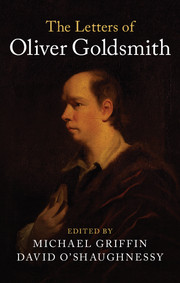16 - To John Newbery, [London, early summer 1762]
Published online by Cambridge University Press: 12 December 2024
Summary
Of a farming family background in Berkshire, John Newbery (bap. 1713, d. 1767) was apprenticed to the printer William Carnan in Reading and would inherit a share of his mentor's business when Carnan died in 1737. He set up as a bookseller in St Paul's Churchyard in London in 1743 and would become famous for his innovative ventures in children's literature. Newbery founded in January 1760 the Public Ledger in which Goldsmith's Chinese letters were first published in 1760–1; he would also publish the collected Chinese letters as The Citizen of the World in 1762. When Goldsmith was arrested for debt in 1762, Newbery purchased a third share in the novel which would be published four years later as The Vicar of Wakefield. He would also publish Goldsmith's History of England and The Traveller, or a Prospect of Society in 1764.
The copy-text is the manuscript in the Free Library of Philadelphia. It was first published by Prior in 1837. It is addressed ‘To Mr. Newbery, St. Paul's Church Yard’. Balderston dates it in the early summer. ‘1762’ is pencilled onto the manuscript by an unknown hand, but it seems fair to date it in the summer of that year for the reason given in Balderston: there exists a receipt of 5 March 1762 from Goldsmith to Newbery – also in the Free Library of Philadelphia – in which Goldsmith writes: ‘Receivd from Mr Newbery eleven guineas and an half for an abridgment of Plutarch's lives’ (see BL, 71n2). That receipt was for the first two volumes, while the second of these letters refers to another payment – of 12 guineas – which would have been for the third and fourth volumes. Balderston gives this pair of letters in a different order; given the sequence of references to the fourth and fifth volumes, however, and the reference in the second letter to his being ‘still not quite recovered’, we suggest that they were marginally more likely to have been composed in the order we give here.
Sir
One Volume is done namely the fourth; When I said I should be glad Mr Collier would do the fifth for me, I only demanded it as a favour, but if he cannot conveniently do it, tho I have kept my chamber these three weeks and am not yet quite recovered yet I will do it.
- Type
- Chapter
- Information
- The Letters of Oliver Goldsmith , pp. 51 - 52Publisher: Cambridge University PressPrint publication year: 2018

